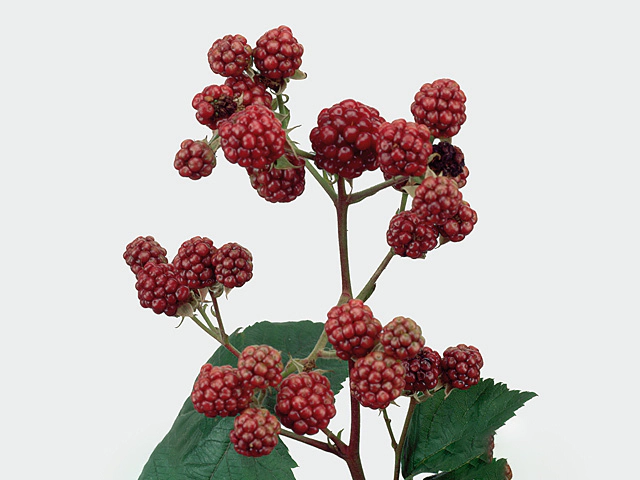Rubus fruticosus 'Chester'

| Winter hardness | Good (USDA-zone 5, 6) |
| Fruit color | Red-dark purple red-053A; Black |
| Fruit size | 2,5 - 3 cm |
| Light conditions | Sunny; Semi-shades |
| Toxicity (if consumed) | Not or barely |
| Moisture requirements | Well-drained |
| Soil type | Humus rich |
Blackberries are a popular fruit known for their sweet and tart flavor, making them a favorite in desserts, jams, and even enjoyed fresh. One popular variety is Rubus fruticosus 'Chester', a blackberry cultivar that has gained fame for its winter hardiness and flavorful fruits.
When it comes to surviving harsh winter conditions, the 'Chester' blackberry excels. It is known to thrive in USDA zones 5 and 6, making it suitable for colder regions. This makes it a fantastic choice for gardeners looking to grow blackberries in areas with snowy and freezing winters.
In terms of appearance, the fruit of the 'Chester' blackberry is a striking sight. It starts with a red-purple hue, known as red-dark purple red-053A, closely resembling that of a ripe raspberry. As the fruit matures, it turns into a rich black color, adding a touch of elegance to any dish it is used in.
Size-wise, the 'Chester' blackberry boasts fruits that measure around 2.5 to 3 cm, making them a manageable size for consumption. Whether you enjoy snacking on fresh berries or incorporating them into recipes, the 'Chester' variety's fruit size is sure to satisfy your taste buds.
For optimal growth, the 'Chester' blackberry prefers sunny to semi-shady light conditions. This means it can be planted in different areas of the garden, as long as it receives a good amount of sunlight. This flexibility makes it easier for gardeners to find suitable locations to grow this variety.
When it comes to toxicity, the 'Chester' blackberry poses little to no risk when consumed. While it is always important to exercise caution when trying new foods, the 'Chester' variety is considered safe for consumption. However, it is worth noting that some people may have individual sensitivities or allergies to blackberries in general.
To ensure optimal growth and fruit production, the 'Chester' blackberry requires well-drained soil. This means that the soil should not retain excess water, as it could lead to root rot and other issues. Additionally, the ideal soil type for this cultivar is humus-rich soil, which is rich in organic matter and provides essential nutrients to the plant.
In conclusion, Rubus fruticosus 'Chester' is an excellent blackberry variety for gardeners in colder regions. With its winter hardiness, stunning fruit colors, manageable fruit size, and flexibility in light conditions, it is a valuable addition to any garden. Gardeners must remember to provide well-drained, humus-rich soil for optimal growth and fruit production. So, if you're looking to grow blackberries that are not only delicious but also thrive in colder climates, the 'Chester' blackberry is the perfect choice.
Market availability index by month:
| Jan. | Feb. | Mar. | Apr. | May | Jun. | Jul. | Aug. | Sep. | Oct. | Nov. | Dec. |
|---|---|---|---|---|---|---|---|---|---|---|---|
| - | - | - | - | 1 | 2 | 3 | 4 | 2 | - | - | - |